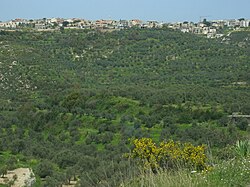Darbechtar ( known also as Darb Ishtar, Arabic: داربعشتار) is a village located on the South-Eastern periphery of the Koura District in the North Governorate of the Republic of Lebanon.
Darbechtar
داربعشتار | |
|---|---|
Village | |
 View of Darbechtar. | |
| Coordinates: 34°16′06″N 35°47′37″E / 34.26833°N 35.79361°E | |
| Country | |
| Governorate | North Governorate |
| District | Koura District |
| Elevation | 300 m (1,000 ft) |
| Time zone | UTC+2 (EET) |
| • Summer (DST) | UTC+3 (EEST) |
| Dialing code | +961 |
Darbechtar borders the villages of Amyoun, Bziza, Majdel, Kaftoun, and Dar-shmizzine. The Village is particularly famous for the Chalouhi, Bou Ghosn, Zoughbi, and other families.
The Lebanese hailing from Darbechtar number 10,000 worldwide. 85% of them live outside Lebanon, mainly in France, Brazil, Argentina, Australia, Canada, the United States.[citation needed]
The population of Darbechtar is Maronite Christian.[1]
Etymology
editThe name of the village is derivative of the Aramaic words, Dar and Ishtar, meaning the House of Astarte. It is believed that the village was the site of an ancient Phoenician shrine for the Goddess of Fertility.[citation needed])
Climate
editDarbechtar : Mediterranean plain village with heavy rains, mild winters and hot dry arid summers.
Min / Max average temperatures in Celsius Degree
Jan (8/16) Feb (9/16) Mar (10/19) Apr (13/22) May (16/25) Jun (19/27) Jul (22/29) Aug (23/30) Sep (20/29) Oct (17/27) Nov (13/22) Dec (10/18)
Environment
editThe village is the home of Olive oil production. Therefore, most of the village is planted with the ever green Olive Trees along with Grapes, Figs, variety of bushes, plants, and flowers.[citation needed])
Olive oil extraction
editTraditionally, olive oil was produced by crushing olives in stone or wooden mortars or beam presses. Nowadays, olives are ground to tiny bits, obtaining a paste that is mixed with water and processed by a centrifuge, which extracts the oil from the paste, leaving behind pomace.[citation needed])
Uses of the Olive Fruit
editOlive Oil is used in cooking, cosmetics, pharmaceuticals, and soaps, and as a fuel for traditional oil lamps. Olive oil is a healthful oil because of its high content of monounsaturated fat (mainly oleic acid) and polyphenols.[citation needed])
Places of worship
editThere are 4 places of Christian worship in Darbechtar mainly Churches:
- Church of Saint George
- Church of Saint Elias
- Church of Saint Chalita
- Church of our Lady of Saydeh
- Church of St Joseph
Photo gallery
edit-
View of Darbechtar.
-
This is the Church of St. Georges.
-
This is the interior of the Church of St. Georges.
-
This is the Church of Saydeh.
-
This is the interior of the Church of Saydeh.
-
This is the way leading to the Cave of St. Elias.
-
This is the Cave of St. Elias.
-
This is the Valley of St. Elias. The Cave of St. Elias is located in this Valley.
-
This is the Church of Mar Chalita.
-
Naher el Asfour.
-
Naher el Asfour.
-
You can find a spring water outlet below ground level.
-
Delicious Grapes.
-
The Olive Fruit.
-
Green Olive Tree Field.
-
The Olive Fruit.
-
The Olive Fruit Harvest.
References
edit- ^ "Municipal and ikhtiyariah elections in Northern Lebanon" (PDF). The Monthly. March 2010. p. 22. Archived from the original on 3 June 2016. Retrieved 2 November 2016.
{{cite web}}: CS1 maint: bot: original URL status unknown (link)
External links
edit- Dar Baaechtar, Localiban
